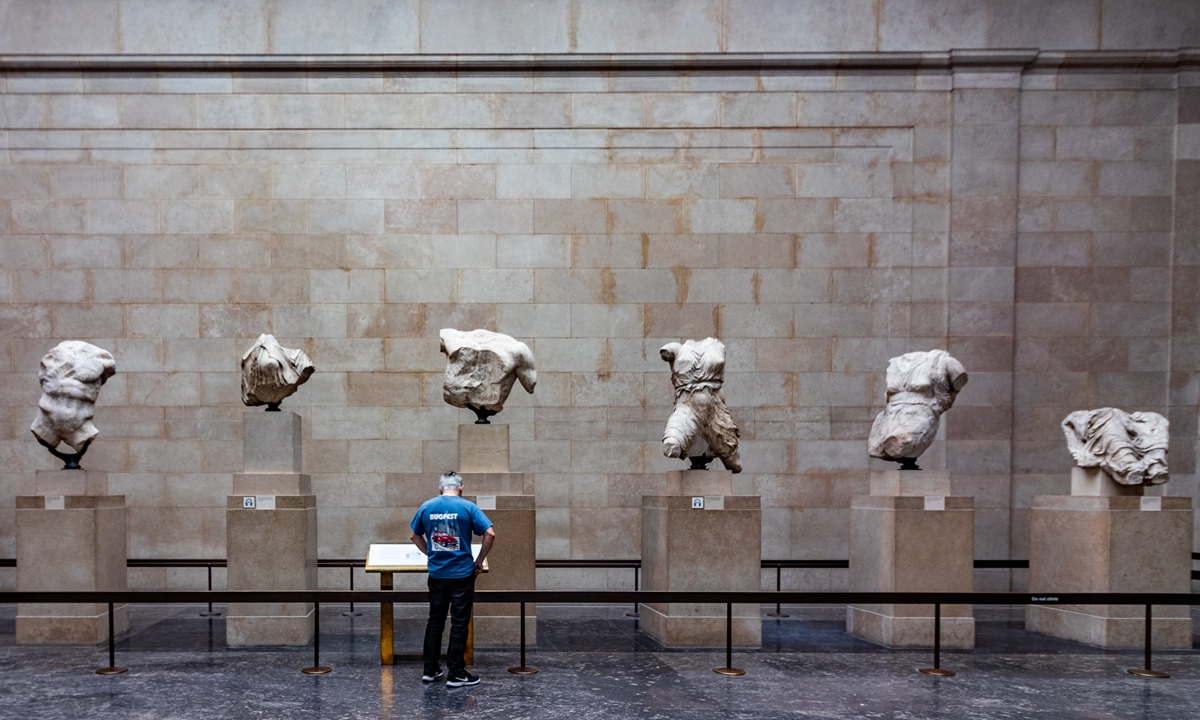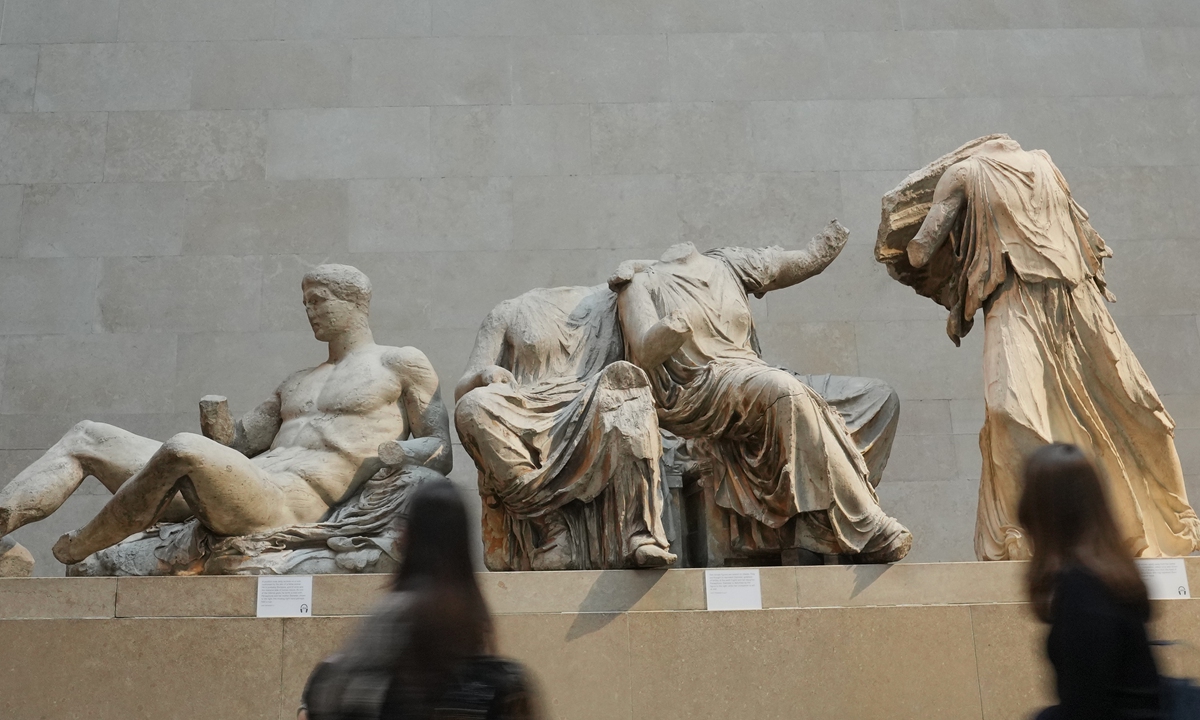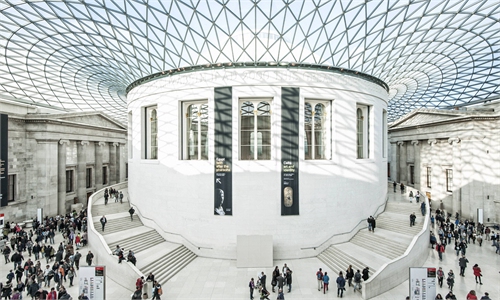ARTS / CULTURE & LEISURE
Parthenon Marbles row renews call for UK to return cultural relics
Time for repatriation

A visitor reads the description of the Parthenon Marbles at the British Museum in London, the UK. Photo: VCG
The unfolding row between Greece and the UK over Athens' call for the return of the Parthenon Sculptures currently housed at the British Museum in London has triggered fresh debates over the repatriation of cultural relics illegally acquired by the UK.
The two European countries have been at loggerheads since November 26 when British Prime Minister Rishi Sunak abruptly cancelled a scheduled meeting with his Greek counterpart Kyriakos Mitsotakis, who had called on Britain to return the relics.
Sunak accused Mitsotakis of trying to "grandstand" over the long-disputed artifacts on November 29 after the Greek leader said he was "annoyed" by the last-ditch cancellation of the meeting.
The escalating row has renewed international calls for the repatriation of cultural relics at the British Museum whose government has stonewalled such pleas from several countries for over a century.
Greece has repeatedly demanded the return of the marbles, which British diplomat Thomas Bruce stripped from the Parthenon temple in Athens in the early 19th century.
A golden opportunity
Huo Zhengxin, a law professor at the China University of Political Science and Law, told the Global Times on Thursday that the latest geopolitical transformations in Europe and the world have offered Greece a historical opportunity to stake its claim.
After Brexit, the relationship between the EU, its member states, and the UK has undergone historic changes. The interests of Europe and the UK have become increasingly divergent. This has provided an opportunity for Greece to use the power of the EU to pile pressure on the UK, said Huo.
In early 2020, Greece demanded the return of "unlawfully removed cultural objects" to their place of origin during the free-trade agreement negotiations between the EU and the UK. Many EU member states then expressed their support to Greece, which put pressure on the UK.
In recent years, Western countries such as France, Germany, and the US have taken significant steps to address geopolitical concerns and improve their national image by promoting the return of illegally acquired cultural relics.
The changing international geopolitical landscape and statures of these countries have rekindled the hopes of restitution for Greece, Huo noted.
Among the over 8 million artifacts collected in the British Museum, more than 100,000 items are from ancient Egypt and an equal number from ancient Greece and ancient Rome.
About 23,000 Chinese relics are held at the museum, among which around 2,000 Chinese relics are on long-term display. The Chinese objects, spanning from the Neolithic age to the present, include paintings, prints, jade, and ceramics.
In 1860, the Second Opium War (1856-60) culminated in British and French troops ransacking the Yuanmingyuan, or Old Summer Palace in Beijing. Looted art and relics subsequently made their way to museums and private collections across Europe.

Visitors walk past sculptures that are part of the Parthenon Marbles at the British Museum in London, the UK. Photo: VCG
International consensusIn the wake of the British Museum theft scandal in August when around 2,000 items were stolen, the voices calling for the museum to return looted relics have become an international consensus in supporting restitution claims by countries like Nigeria, Greece, China and Egypt.
Zahi Hawass, Egypt's former minister of state for antiquities affairs, took to petition platform change.org to condemn the British Museum and ask for the return of Egypt's Rosetta Stone.
Hawass told the Global Times that countries like Greece, Egypt and China need to make joint efforts to see the stolen artifacts repatriated.
In China, the hashtag "British Museum must return Chinese cultural relics for free" has accumulated billions of views on China's social media platform Sina Weibo.
Such calls are not just from the international community. Voices in the UK also emerged to condemn the British Museum.
Commenting on the thefts, Dan Hicks, curator at the Pitt Rivers Museum in Oxford, told The Art Newspaper that "the last remaining argument against restitution has been lost."
Member of Parliament Bell Ribeiro-Addy told the Guardian: "One of the most insulting reasons that they've given is that the other countries that these items belong to would either not be able to take care of them or they are likely to be stolen. But you've got people in this country putting them on eBay." She also pointed out the irony of the stolen objects being offered online for a fraction of their value.
Restore justice
Professor Huo told the Global Times that the British government has to weigh up the Greek plea.
"It will undoubtedly damage Britain's already poor national image and declining international clout if they remain elusive about it. However, it's difficult to reach a substantive agreement at the moment," Huo said.
"The looted cultural relics collected in the British Museum and other museums in the UK are innumerable, and the 'domino effect' caused by the return of the Parthenon Marbles is obviously unbearable for the British government."
But from a historical development perspective, promoting the return of cultural relics to their countries of origin is an essential step toward rectifying past injustices, restoring international justice, and aligning with the overall trajectory of human society's progress, he noted.
The British government has been pushed to the wall under growing international pressure as a number of countries have taken the initiative to seek redress for past wrongdoings.
In December 2022, Germany handed over 22 precious artifacts that were looted by British soldiers from the former Kingdom of Benin 125 years ago to Nigeria.
According to an agreement reached earlier in 2022, Germany promised to return around 1,100 bronzes from 20 of its museums to Nigeria, and both sides agreed on the importance of making the works accessible to the public.
Nigerian Culture Minister Lai Mohammed said at the handover ceremony that he hoped Germany's move would nudge the UK into opening talks about the bronzes held at the British Museum.
In November 2021, the Metropolitan Museum of Art in New York returned three Benin bronzes to the Nigerian National Commission for Museums and Monuments.
Also in 2021, France transferred 26 artworks seized by French colonial soldiers in 1892 to Benin, marking the largest restitution by France to a former colony.

